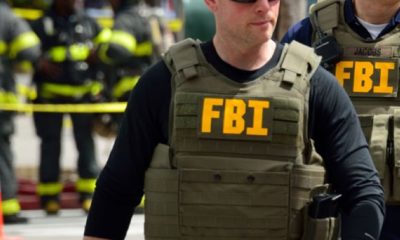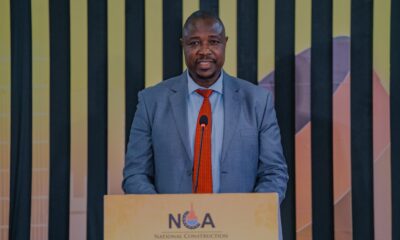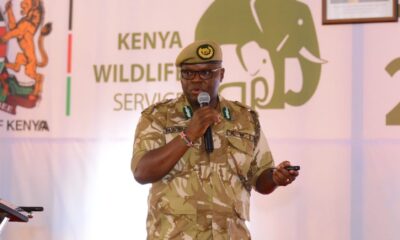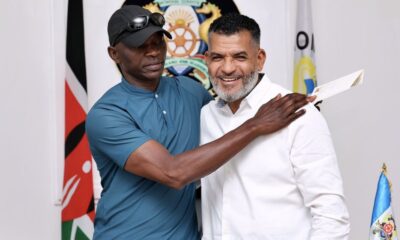Investigations
How Kenyan Businessman Joined Mexican Cartel’s Sh7.5B Weapons Network
The CJNG wanted ZU-23 anti-aircraft systems, twin-barrel autocannons capable of neutralizing aircraft, drones, and armored vehicles.

The untold story of Elisha Asumo’s descent into international arms trafficking
The phone call that changed Elisha Odhiambo Asumo’s life came in September 2022. On the other end was Peter Dimitrov Mirchev, a Bulgarian arms dealer with connections to some of the world’s most dangerous criminals.
Mirchev had a proposition that would eventually land the Kenyan businessman in a Moroccan prison, awaiting extradition to face a potential life sentence in the United States.
Court documents reveal that Mirchev had been contracted by Mexico’s Cartel de Jalisco Nueva Generación (CJNG) to supply military-grade weapons worth $58 million, approximately Sh7.49 billion.
He needed reliable partners, and Asumo’s reputation for navigating complex international transactions and falsifying documents made him an ideal recruit.
Asumo understood he couldn’t handle such a massive operation alone.
He quickly assembled a regional network, first recruiting Michael Katungi Mpeirwe, a Ugandan described in court files as “a long-time associate in arms deals.”
Mpeirwe then brought in Tanzanian Subiro Osmund Mwapinga, creating a triangle of corruption spanning Kenya, Uganda, and Tanzania.
This wasn’t amateur hour.
Each member brought specific expertise: Asumo provided Kenyan financial infrastructure and connections, Mpeirwe contributed Ugandan logistics knowledge, and Mwapinga offered access to Tanzanian military documentation systems.
By involving nationals from multiple countries, they could exploit different legal systems and banking structures while spreading risk.
Weapon list
The weapons list maintained by Mirchev read like a military catalog designed for warfare.
The CJNG wanted ZU-23 anti-aircraft systems, twin-barrel autocannons capable of neutralizing aircraft, drones, and armored vehicles.
They also requested rocket-propelled grenades, machine guns, night vision equipment, armored vehicles, and battle tanks.
This wasn’t just about controlling drug routes.
The sophistication of the wishlist showed the CJNG’s evolution from a trafficking organization into what US prosecutors now classify as a “foreign terrorist organization.”
The cartel operates across continents, with established networks in the Americas, Europe, Asia, Australia, and crucially for this story, Africa.
Before attempting the massive transfer, the network conducted a trial run with 50 AK-47 assault rifles and ammunition.
This test revealed Asumo’s particular value: his ability to create convincing falsified documents.
The rifles came with forged end-user certificates allegedly from Tanzania, claiming the weapons were manufactured by a Tanzanian company and intended solely for the country’s military.
When authorities intercepted this shipment, Asumo quickly produced a falsified letter from the Tanzanian Defence Permanent Secretary, supposedly confirming Tanzania had received the rifles.
For this trial operation, he received $35,000 through bank accounts in Kenya and the United States, establishing the financial infrastructure that would have supported the larger operation.
Facing the dreaded cartel members and arrest
In March 2023, Asumo and Mwapinga were paid thousands of dollars to attend face-to-face meetings with CJNG representatives.
During these encounters, the cartel expanded their proposal beyond weapons trafficking.
They wanted to use the East African network to facilitate cocaine trafficking, with the region serving as a transit hub for drugs destined for global markets.
The meetings revealed the CJNG’s integrated criminal approach, using the same networks established for weapons procurement to simultaneously handle drug trafficking.
East Africa, with its complex political landscape, multiple maritime access points, and developing regulatory frameworks, represented an ideal expansion target for the cartel’s global operations.
The international scope of the operation required a coordinated global response.
Arrest warrants issued on December 20, 2024, triggered operations across multiple continents. Mirchev was arrested in Madrid, Mwapinga in Accra, and finally, Asumo was captured at a Casablanca hotel on April 8, 2025.
During his arrest, authorities found Asumo with mixed foreign currency including 70 UAE dirhams, $32, and 20 Swiss francs, along with four ATM cards, including two from Kenyan banks and one from a Kenyan microfinance institution.
The diversity of his financial instruments painted a picture of someone maintaining international operations across multiple jurisdictions.
The case becomes even more troubling when considering Mirchev’s connection to Viktor Bout, the notorious “Merchant of Death” convicted in the US in 2012. Bout’s networks, built over decades of arms trafficking, apparently continue operating despite their leader’s imprisonment.
This suggests the Asumo operation may have been just one component of a much larger, established trafficking network that spans continents and criminal organizations.
The ease with which this network operated across three East African countries reveals uncomfortable truths about the region’s vulnerability to criminal exploitation.
The ability to create convincing government documents suggests either corruption within official systems or highly sophisticated criminal capabilities, possibly both.
Most concerning is evidence that East Africa is being integrated into global criminal networks not just as a transit point, but as a full operational partner.
The CJNG’s willingness to pay for face-to-face meetings and propose long-term partnerships shows they view the region as strategically important for global expansion.
This represents a fundamental shift in how international criminal organizations view Africa, moving from exploitation to partnership in their global operations.
Asumo and his co-conspirators face severe charges including conspiracy to provide material support to a foreign terrorist organization, conspiracy to distribute cocaine, and conspiracy to possess firearms in furtherance of drug trafficking.
Each faces a minimum of 10 years and a maximum of life imprisonment. US prosecutors are reportedly seeking a life sentence for Asumo specifically.
Mwapinga has already been extradited to the United States and likely serves as a key witness in building cases against his former co-conspirators. Mpeirwe remains at large, while extradition proceedings continue for both Mirchev in Spain and Asumo in Morocco, where he awaits a decision that could seal his fate.
US Attorney Erik Siebert and DEA Special Agent Louis D’Ambrosio have positioned these arrests as part of “Operation Take Back America,” a nationwide drive to eliminate cartels and transnational criminal organizations.
The investigation, conducted by the DEA’s Special Operations Division with support from international partners including the Hellenic National Police in Greece, demonstrates the global cooperation required to combat modern organized crime.
The Asumo case serves as a stark warning about the globalization of criminal enterprise and East Africa’s vulnerability to exploitation by transnational organizations. His journey from businessman to international arms trafficker illustrates how quickly criminal organizations can corrupt individuals and exploit regional weaknesses in regulatory systems and international cooperation.
While the arrests represent a significant victory for international law enforcement, they also reveal the extent to which transnational criminals have successfully established sophisticated operations in East Africa.
The CJNG’s expansion into the region represents a strategic shift that law enforcement agencies are still working to fully understand and combat effectively.
The sophistication of the operation, from document falsification to international financial transfers, suggests that criminal organizations are investing heavily in African operations and view the continent as crucial to their global expansion strategies.
This should serve as a wake-up call for governments, financial institutions, and security services across the region.
As Asumo sits in his Moroccan cell, potentially facing life in an American prison, his case continues to reverberate across East Africa and international law enforcement circles.
The weapons were never delivered, the drugs never trafficked, and the network was disrupted, representing important victories for international cooperation against organized crime.
However, the ease with which this network was established and the sophistication of its operations suggest that the fight against transnational crime in East Africa is far from over.
The question now facing the region is not whether other criminal networks will attempt similar operations, but how quickly regional governments and international partners can strengthen defenses against the increasingly sophisticated methods employed by global criminal organizations.
The Asumo case may have ended one criminal enterprise, but it has also provided a blueprint that other organizations may attempt to follow, making regional cooperation and international vigilance more crucial than ever in the ongoing fight against transnational organized crime.
Kenya Insights allows guest blogging, if you want to be published on Kenya’s most authoritative and accurate blog, have an expose, news TIPS, story angles, human interest stories, drop us an email on [email protected] or via Telegram
-

 Investigations2 weeks ago
Investigations2 weeks agoInside Nairobi Firm Used To Launder Millions From Minnesota Sh39 Billion Fraud
-

 News2 weeks ago
News2 weeks agoPastor James Irungu Collapses After 79 Hours Into 80-Hour Tree-Hugging Challenge, Rushed to Hospital
-

 Business2 weeks ago
Business2 weeks agoMost Safaricom Customers Feel They’re Being Conned By Their Billing System
-

 News2 weeks ago
News2 weeks agoUnfit for Office: The Damning Case Against NCA Boss Maurice Akech as Bodies Pile Up
-

 News2 weeks ago
News2 weeks agoTax Payers Could Lose Millions in KWS Sh710 Insurance Tender Scam As Rot in The Agency Gets Exposed Further
-

 News2 weeks ago
News2 weeks agoDeath Traps: Nairobi Sitting on a Time Bomb as 85 Per Cent of Buildings Risk Collapse
-

 News2 weeks ago
News2 weeks agoRaila Bodyguard Maurice Ogeta Appointed As Mombasa Security County Adviser
-

 Investigations6 days ago
Investigations6 days agoKERRA Homa Bay Region Manager Calvince Thomas Accused of Swindling Businessman Ksh 2 Million in Phantom Tender Deal
















